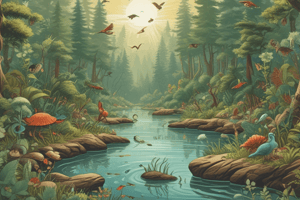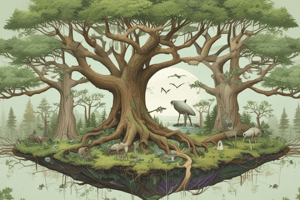Podcast
Questions and Answers
¿Imahita uchirinakanaka uchiriririka yaririnaka?
¿Imahita uchirinakanaka uchiriririka yaririnaka?
Kikinti uchiririka uchirinakanaka yaririnaka
¿Irantekirira uchirinaka itaritirika uchiriririka?
¿Irantekirira uchirinaka itaritirika uchiriririka?
Kikinti uchirinaka itaritirika uchiriririka
¿Irantekirira uchirinaka itaritirika yaririnaka?
¿Irantekirira uchirinaka itaritirika yaririnaka?
Kikinti uchirinaka itaritirika yaririnaka
¿Kanantirira uchiririka ijakakiriririka?
¿Kanantirira uchiririka ijakakiriririka?
¿Kanantirira uchiririka uchirinakanaka yaririnaka?
¿Kanantirira uchiririka uchirinakanaka yaririnaka?
¿Irantekirira uchirinaka iraniriririka uchiriririka?
¿Irantekirira uchirinaka iraniriririka uchiriririka?
¿Ja'yaamaraara jachaa ti'oaquinaracü?
¿Ja'yaamaraara jachaa ti'oaquinaracü?
¿Jä'qüaracü jachaa ti'oaquinaracü?
¿Jä'qüaracü jachaa ti'oaquinaracü?
¿Ja'yaamaraara jäqüaracü jachaa ti'oaquinaracü?
¿Ja'yaamaraara jäqüaracü jachaa ti'oaquinaracü?
¿Ja'yaamaraara jäqüaracü jachaa ti'oaquinaracü?
¿Ja'yaamaraara jäqüaracü jachaa ti'oaquinaracü?
¿Ja'yaamaraara jäqüaracü jachaa ti'oaquinaracü?
¿Ja'yaamaraara jäqüaracü jachaa ti'oaquinaracü?
¿Jä'qüaracü ti'oaquinaracü jachaa ja'yaamaraara?
¿Jä'qüaracü ti'oaquinaracü jachaa ja'yaamaraara?
Study Notes
Science 8 Standards: Exploring Ecosystems
Overview
In Science 8, students are introduced to the study of ecosystems, a fundamental aspect of ecology. Ecosystems are complex networks of organisms interacting with each other and their physical environment. This article will provide a comprehensive overview of the Science 8 standards related to ecosystems, including the key concepts, skills, and benchmarks students should master by the end of the course.
Key Concepts
Science 8 standards emphasize several key concepts related to ecosystems:
- Organisms and their roles: Students learn about different types of organisms within ecosystems and their specific roles in maintaining balance.
- Interactions between organisms: This includes predator-prey relationships, symbiotic partnerships, and competition for resources.
- Ecosystem services: Students understand how ecosystems contribute to human well-being by providing goods such as food, timber, fresh water, and fiber, as well as regulating climate, purifying air and water, and protecting soil from erosion.
- Human impact on ecosystems: Students examine the ways in which human activities affect ecosystems and explore strategies to mitigate these impacts.
Skills Developed
Throughout Science 8, students will develop various skills necessary for understanding ecosystems:
- Observing, measuring, and recording data: Students practice collecting and analyzing data through fieldwork, experiments, and observations.
- Analyzing information and interpreting results: They develop critical thinking and problem-solving abilities to make informed conclusions based on scientific evidence.
- Communicating findings: Students express their ideas through written reports, oral presentations, and group discussions.
- Applying knowledge to real-world situations: They learn to connect scientific concepts with practical applications and appreciate the importance of ecological principles for society.
Benchmarks
By the end of Science 8, students should demonstrate mastery of the following benchmarks related to ecosystems:
- Understanding of organismal diversity and roles: Students can describe various species within ecosystems and explain their functions in maintaining equilibrium.
- Awareness of interactions among organisms: Students recognize patterns of coexistence, competition, and mutualism among species.
- Recognition of ecosystem services: They can identify goods and benefits humans derive from ecosystems and discuss strategies to preserve these services.
- Understanding of human impacts on ecosystems: Students grasp how human activities alter ecosystems and demonstrate knowledge of mitigation measures.
Engaging with Ecosystems
In Science 8, students will explore ecosystems through a variety of engaging activities:
- Fieldwork: Visiting local habitats to observe organisms in their natural environments.
- Experiments: Investigating relationships between predators and prey, symbiotic interactions, and resource availability.
- Collaborative projects: Partnering with other students to design marketing campaigns raising awareness about ecosystems and their importance.
- Community connections: Collaborating with local organizations to implement ecological restoration projects.
As the next chapter unfolds, we delve deeper into the intricacies of ecosystems, allowing students to further broaden their horizons and gain a profound appreciation for these dynamic networks of living and non-living components.
Studying That Suits You
Use AI to generate personalized quizzes and flashcards to suit your learning preferences.
Description
Test your knowledge of Science 8 standards related to ecosystems by exploring key concepts, skills, and benchmarks students should master. Learn about organisms, interactions, ecosystem services, human impacts, and more.




